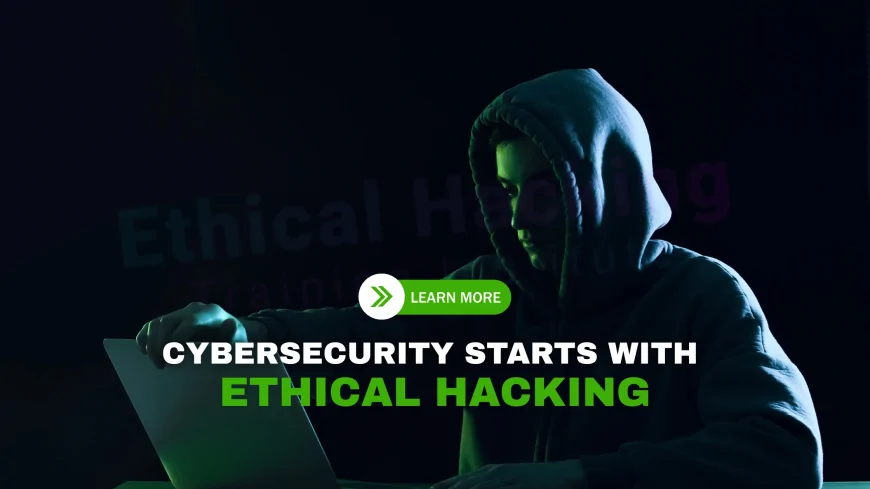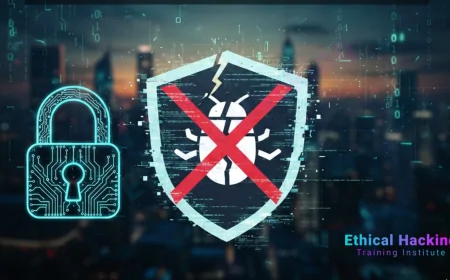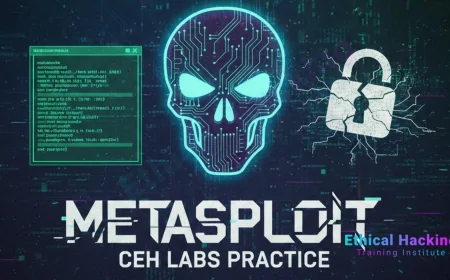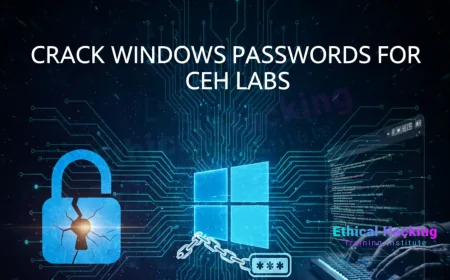Cyber Security Ethical Hacking: The Ultimate Career Path for Aspiring Cybersecurity Experts | Cybersecurity Careers Start Here: Why Ethical Hacking is the Smartest Path
Discover how to start a successful career in cybersecurity ethical hacking. Learn about key skills, certifications like CEH & OSCP, job roles, salary potential, and hands-on training options for aspiring cybersecurity experts.

Table of Contents
- Introduction
- Why Choose Ethical Hacking?
- Core Skills You’ll Develop
- Key Certifications (CEH, OSCP, etc.)
- Recommended Learning Path
- Training Options — Online & Offline
- Essential Tools & Technologies
- Hands-On Learning & Labs
- Career Opportunities & Job Roles
- Salary & Growth Prospects
- Industry Demand & Trends
- Freelancing & Bug Bounty Pathways
- Challenges & How to Overcome Them
- Future-Proofing Your Career
- Student & Professional Stories
- How to Start Right Now
- FAQs
- Conclusion
Introduction
Ethical hacking is more than a buzzword—it’s the frontline of modern cybersecurity defense. This guide explains why pursuing a career in cyber security ethical hacking is a smart move for aspiring experts and how you can make that leap.
Why Choose Ethical Hacking?
Ethical hacking offers thrilling, hands-on work, high demand, impressive salaries, and the satisfaction of protecting digital assets. As cyber threats evolve, so does the need for skilled defenders who think like attackers.
Core Skills You’ll Develop
- Networking & Protocol Analysis (TCP/IP, DNS, HTTP, etc.)
- System & Web Application Vulnerabilities
- Penetration Testing Methodologies (PTES, OWASP)
- Scripting & Automation (Python, Bash)
- Reverse Engineering & Malware Analysis
- Cloud & IoT Security
- Report Writing & Security Communication
Key Certifications (CEH, OSCP, etc.)
Industry qualifications include:
- CEH – Entry-level ethical hacking (EC-Council)
- OSCP – Advanced practical penetration testing (OffSec)
- CompTIA Pentest+ – Intermediate penetration testing
- GPEN – Penetration tester credential (GIAC)
- eJPT – Entry-level penetration tester (eLearnSecurity)
Recommended Learning Path
- Start with foundational IT skills & networking
- Practice on CTFs like TryHackMe, HackTheBox
- Pursue CEH as your first certification
- Advance to OSCP or GPEN for deep practical expertise
Training Options — Online & Offline
Choose between structured bootcamps, college electives, virtual labs, and self-paced video labs based on your budget and learning style.
Essential Tools & Technologies
- Network Scans: Nmap, Masscan
- Web Attacks: Burp Suite, OWASP ZAP, SQLmap
- Exploitation: Metasploit, Cobalt Strike
- Wi‑Fi Attacks: Aircrack-ng, Wifite
- Sniffing & Traffic: Wireshark, tcpdump
- Password Cracking: Hashcat, John the Ripper
Hands-On Learning & Labs
Set up home labs using virtual machines or cloud VPS. Engage with real-world scenarios like network pentests, web app exploitation, and reverse-engineering challenges.
Career Opportunities & Job Roles
- Ethical Hacker / Penetration Tester
- Security Analyst / SOC Engineer
- Application Security Specialist
- Incident Response Engineer
- Red Team Specialist
Salary & Growth Prospects
Entry-level roles start around ₹5–8 LPA in India, moving to ₹15–25 LPA with experience and advanced certifications like OSCP.
Industry Demand & Trends
Governments, enterprises, and SMEs demand ethical hackers for compliance, threat intelligence, bug bounties, and secure DevOps.
Freelancing & Bug Bounty Pathways
Ethical hackers can join platforms like HackerOne and Bugcrowd, or provide pentest services to startups and small businesses.
Challenges & How to Overcome Them
Stay ahead of new threats, legal/privacy complexities, high learning curve, and burnout—manage through continuous education and self-care.
Future‑Proofing Your Career
Cybersecurity is one of the fastest-evolving fields, and to stay ahead, ethical hackers must continuously adapt. Future-proofing your career means committing to lifelong learning and staying updated with emerging threats, technologies, and defense strategies.
Start by mastering cloud security, as most infrastructures are shifting to AWS, Azure, and Google Cloud. Learn about DevSecOps to integrate security into development pipelines. Get comfortable with AI-powered threats, zero-trust architecture, IoT vulnerabilities, and supply chain attacks—these are the future battlegrounds.
Stay active in communities, attend cybersecurity conferences (DEF CON, Black Hat, Nullcon), follow trusted researchers, and regularly practice on platforms like Hack The Box or TryHackMe.
Earning advanced certifications like OSCP, CRTP, or CISSP will keep your skills sharp and validate your expertise. In this fast-paced domain, curiosity, adaptability, and hands-on experience are your best assets.
By evolving with the industry, you not only secure your career but also become an indispensable part of tomorrow’s digital defense.
Student & Professional Stories
Showcase real journeys of successful ethical hackers who started from zero, earned certifications, and now work with MNCs or run red teams.
How to Start Right Now
Getting started in cybersecurity ethical hacking may seem overwhelming at first, but it becomes manageable when broken down into structured, achievable steps. Here’s exactly how you can begin your journey right now—even with zero prior experience:
1. Understand the Basics of IT & Networking
Before diving into hacking techniques, you must build a strong foundation in information technology:
-
Learn how operating systems (especially Linux and Windows) work.
-
Study basic networking concepts: TCP/IP, DNS, DHCP, HTTP, VPNs, firewalls, etc.
-
Get familiar with command-line usage (especially Bash and PowerShell).
Free resources:
2. Set Up a Home Lab
You don’t need expensive hardware—just install a few free tools:
-
Use VirtualBox or VMware to set up virtual machines.
-
Install Kali Linux, Parrot OS, or Metasploitable to practice tools safely.
-
Create an isolated test environment (never hack real systems without permission).
3. Register on Beginner-Friendly Platforms
Hands-on platforms make ethical hacking fun and interactive:
-
TryHackMe – Beginner labs with gamified learning.
-
Hack The Box (HTB) – More advanced, real-world scenarios.
-
OverTheWire, PortSwigger Labs, and PentesterLab are also great.
4. Learn One Programming Language
Coding helps you understand scripts, payloads, and automation. Start with:
-
Python – Ideal for writing custom scripts and scanning tools.
-
Bash – For automation on Linux systems.
You don’t need to master them—just enough to read, tweak, and modify code.
5. Take a Beginner Ethical Hacking Course
Enroll in an introductory course that explains core ethical hacking concepts:
-
CEH (Certified Ethical Hacker) for theory + tools
-
eJPT (Junior Penetration Tester) for practical, hands-on skills
-
Udemy, Coursera, or local cybersecurity academies can be great starting points
6. Join Cybersecurity Communities
Engage with others who are also learning:
-
Reddit: r/netsecstudents, r/cybersecurity
-
Discord: Join hacker groups, CTF communities
-
LinkedIn: Follow ethical hackers, connect with mentors
7. Commit to a Learning Plan
Set realistic weekly goals:
-
3 hours/week theory
-
2 hours/week labs
-
1 CTF challenge/week
Track progress, revise often, and reward yourself for milestones.
Frequently Asked Questions
1. What is ethical hacking?
Ethical hacking is legally simulating cyberattacks in order to find and fix vulnerabilities before malicious actors can exploit them.
2. Do I need a degree to become an ethical hacker?
No, certification and hands-on experience matter more than a conventional degree—many hackers are self-taught or bootcamp-trained.
3. Which certification should I start with?
Begin with CEH for fundamentals, then move to OSCP or GPEN for advanced practical skills.
4. Is coding necessary for ethical hacking?
While scripting knowledge (like Python and Bash) greatly helps automation and exploit writing, many tasks can be done with minimal coding.
5. Can beginners start ethical hacking?
Yes! Beginners can use resources like TryHackMe, free labs, and online communities to start learning.
6. How long does it take to land a job?
With focused study and labs, you can qualify for entry-level roles within 6–12 months.
7. What salary can I expect?
In India, starting salaries range from ₹5–8 LPA, rising to ₹20–30 LPA for experts.
8. Are ethical hacking jobs remote-friendly?
Many security roles are fully remote or hybrid, especially for penetration testing and consulting.
9. What’s the difference between red‑team and blue‑team?
Red‑teamers simulate attacks, blue‑teamers defend and fortify systems; ethical hackers can work in both areas.
10. Can ethical hackers work in government?
Yes, many government agencies hire ethical hackers for security audits, SOC roles, and cybersecurity policy roles.
11. What tools should I master first?
Start with Nmap, Wireshark, Metasploit, and Burp Suite—they form the core toolkit.
12. What is bug bounty hunting?
Bug bounty hunters find vulnerabilities in live products and earn rewards directly from companies for valid findings.
13. Do ethical hackers need soft skills?
Absolutely—communication, report writing, and client interaction are key in presenting findings and mitigation advice.
14. How often do I need to re‑certify?
Certificates like CEH are valid for 3 years; OSCP certifications currently do not expire but staying updated is recommended.
15. Can I freelance as an ethical hacker?
Yes, with certifications and experience, you can offer pent services independently and build a client base.
16. How do I overcome imposter syndrome?
Join ethical hacking communities, mentor others, celebrate small victories, and remember continuous learning is normal.
17. Is ethical hacking risky or illegal?
Legal risk only arises when testing without explicit permission. Ethical hacking is always permissioned, documented, and scoped.
18. Can I specialize in web, network, or mobile hacking?
Yes! Many ethical hackers specialize and become experts in focused domains like web or mobile security testing.
19. Are there women-focused cybersecurity initiatives?
Yes, many communities and scholarships support women in cybersecurity, including WiCyS, Ladies Hack, and Girls Who Code.
20. What’s the future of ethical hacking?
Ethical hacking will continue to evolve with AI-driven attacks, cloud & IoT exposures, and integration into DevSecOps pipelines.
Conclusion
Cyber Security Ethical Hacking is a challenging, rewarding, and future‑proof career path. By building core skills, pursuing relevant certifications, practicing consistently, and joining strong communities, you can begin a journey toward becoming a trusted cybersecurity expert protecting digital infrastructure worldwide.
What's Your Reaction?
 Like
0
Like
0
 Dislike
0
Dislike
0
 Love
0
Love
0
 Funny
0
Funny
0
 Angry
0
Angry
0
 Sad
0
Sad
0
 Wow
0
Wow
0

















